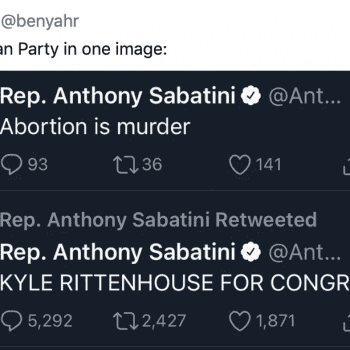Last week the New York Times published an op-ed on the history and reality of illegal abortion. Here’s an excerpt:
Leeches, Lye and Spanish Fly
By KATE MANNING
WHY would a woman put a leech inside her body, in the most private of female places? Why would she put cayenne pepper there?
Why might a woman swallow lye? Gunpowder? Why would a woman hit herself about the abdomen with a meat pulverizer? A brickbat? Throw herself down the stairs?
Why would she syringe herself, internally, with turpentine? Gin? Drink laundry bluing?
Why might she probe herself with a piece of whalebone? A turkey feather? A knitting needle?
Why would she consume medicine made of pulverized Spanish fly? How about powdered ergot, a poisonous fungus? Or strychnine, a poison?
Why would she take a bath in scalding water? Or spend the night in the snow?
Because she wanted to end a pregnancy. Historically, women have chosen all those methods to induce abortion.
…
Women’s historical willingness to endure horrible dangers, to submit to extreme and prolonged pain, to risk grave injury and death rather than remain pregnant, tells us something important about female desperation and determination, and the price women were — and still are — willing to pay to control their own bodies. What it tells us is that women will always find ways to end an unwanted pregnancy, no matter what the law says, no matter the risks to themselves.
If the Supreme Court were ever to overturn Roe v. Wade, or if anti-abortion forces continue to successfully chisel away at a woman’s access to safe abortion, many women will still choose abortion — by their own hands. Leeches, lye and Spanish fly are still among the many tools available to the self-abortionist. So are knitting needles, with predictable, disastrous consequences. There is no law that will end the practice of abortion, only laws that can protect a woman’s right to choose it, or not, and to keep it the safe and private procedure still available to us in 2013, 40 years after the Supreme Court made it legal.
This article brought two thoughts to mind. First, as a child and teen I saw abortion as a relatively new phenomenon, a result of the sexual revolution or of modern selfishness. Along that line, I think abortion opponents have a rather ahistorical view of abortion — a view articles like this aim to set straight. Second, it seems like abortion opponents generally tend to see abortion like any other crime, as though it’s something you can just ban and have it over with. The thing is, trying to prevent abortion is a bit like trying to prevent starving people from stealing food. For one thing, abortion springs from a place of absolute desperation. And for another thing, the consequences of not obtaining an abortion are life-altering in a way the consequences of not committing murder or burglary are not. This puts abortion in a very different category from most of the things we tend to slap a legal ban on, and this has consequences when it comes to things like enforcement.
In the end, I think we don’t talk enough about the history of abortion or about the reality of illegal abortion.










